Implementation of binary tree storage mode, traversal deletion and other functions

1、 Continuous stored binary tree
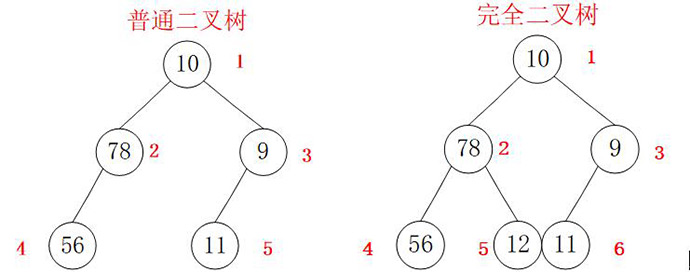
1. Declare a complete binary tree class
class BTreeArray<T> { private T[] bTree; private int count; public BTreeArray(int _number) { count = 0; bTree = new T[_number]; } public bool Add(T _item) { //Storage full if (count >= bTree.Length) { ShowInfo ("storage space is full"); return false; } //Store data bTree[count++] = _item; return true; } private void ShowInfo(string _str) { StringBuilder sb = new StringBuilder(); sb.Append("BTree:"); sb.Append(_str); Console.WriteLine(sb.ToString()); } }
2. Complete binary tree traversal
A Preorder traversal (DLR)
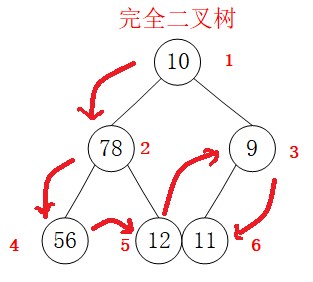
private void BTreeDLR(int _index) { //Node number is 1 greater than array index int index = _index - 1; //When the index is greater than the total number, the node does not exist if (index >= count) { return; } //Access yourself first Console.WriteLine(bTree[index]); //Access the left child node BTreeDLR(_index * 2); //Access the right child node BTreeDLR(_index * 2 + 1); } public void BTreeDLR() { BTreeDLR(1); }
int[] data = {10,78,9,56,12,11}; BTreeArray<int> bTree = new BTreeArray<int>(data.Length); for (int i = 0; i < data.Length; i++) { bTree.Add(data[i]); } bTree.BTreeDLR(); Console.ReadKey();
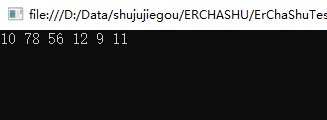
B Middle order traversal (LDR)
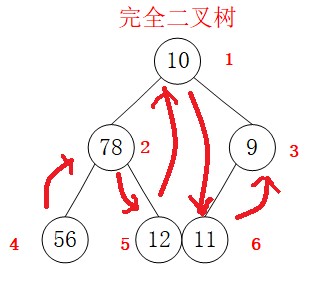
private void BTreeLDR(int _index) { //Node number is 1 greater than array index int index = _index - 1; //When the index is greater than the total number, it indicates that the end of the road has been reached if (index >= count) { return; } //Access the left child node BTreeLDR(_index * 2); //Access self Console.Write(bTree[index] + " "); //Access the right child node BTreeLDR(_index * 2 + 1); } public void BTreeLDR() { BTreeLDR(1); }
bTree.BTreeLDR();
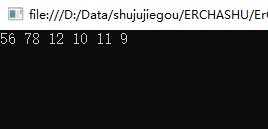
C Post order traversal (LRD)
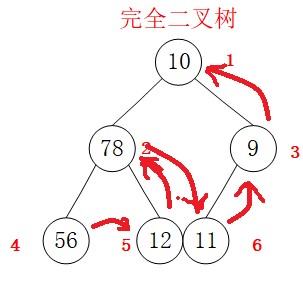
private void BTreeLRD(int _index) { int index = _index - 1; if (index >= count) { return; } BTreeLRD(_index * 2); BTreeLRD(_index * 2 + 1); Console.Write(bTree[index] + " "); } public void BTreeLRD() { BTreeLRD(1); }
bTree.LRD();
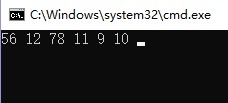
2、 Binary tree stored in linked list
1. Declare sorting binary tree
class BTreeLink { private BTreeLinkNode<int> headNode; public BTreeLink(BTreeLinkNode<int> _root) { headNode = _root; } } class BTreeLinkNode<T> where T:struct { public BTreeLinkNode<T> Parent { get; set; } public BTreeLinkNode<T> LChild { get; set; } public BTreeLinkNode<T> RChild { get; set; } public T Data { get; set; } public BTreeLinkNode(T _data) { Data = _data; } } 2. Sort Binary Tree Add Node
public bool Add(int _data) { Console. WriteLine ("to add"+_data); BTreeLinkNode<int> node = new BTreeLinkNode<int>(_data); if (headNode == null) { headNode = node; return true; } if (node == null) { return false; } BTreeLinkNode<int> temp = headNode; while (true) { if (node.Data <= temp.Data) { Console. WriteLine ("Check, the added value is less than"+temp. Data); //Less than, placed at the left node if (temp.LChild == null) { Console. WriteLine ("The current node has no left child node"); //Left node is empty temp.LChild = node; node.Parent = temp; break; }else { temp = temp.LChild; } } else if (node.Data > temp.Data) { Console. WriteLine ("Check, the added value is greater than"+temp. Data); if (temp.RChild == null) { Console. WriteLine ("The current node has no right child node"); //The right node is empty temp.RChild = node; node.Parent = temp; break; }else { temp = temp.RChild; } } } return true; }
3. Sort the binary tree to find the node
public BTreeLinkNode<int> Find(int _data) { BTreeLinkNode<int> temp = headNode; while (true) { if (temp == null) { //Not found return null; } if (temp.Data == _data) { //Find return temp; } if (_data > temp.Data) { //Find Right temp = temp.RChild; }else { //Find Left temp = temp.LChild; } } }
public BTreeLinkNode<int> Find(int _data,BTreeLinkNode<int> _node) { if (_node == null) { //Jump out Console. WriteLine ("BTree: no node with the value of"+_data+"was found"); return null; } if (_data == _node.Data) { return _node; } else if (_data < _node.Data) { _node = _node.LChild; }else { _node = _node.RChild; } //Recursion return Find(_data, _node); }
BTreeLinkNode testNode = bTreeLink.Find(19); BTreeLinkNode testNode1 = bTreeLink.Find(15, root); if (testNode != null && testNode1 != null) { Console. WriteLine ("Found"+testNode. Data); Console. WriteLine ("Found"+testNode1. Data); }

4. Sort Binary Tree Delete Node
public bool Del(int _data) { BTreeLinkNode<int> temp = Find(_data); if (temp == null) { Console. WriteLine ("BTree:: Del: deletion failed, no node with the value of"+_data+"exists); return false; } return Del(temp); } public bool Del(BTreeLinkNode<int> _node) { BTreeLinkNode<int> temp; if (_node.LChild == null && _node.RChild == null) { //Leaf node, delete directly if (_node.Data > _node.Parent.Data) { _node.Parent.RChild = null; } else { _node.Parent.LChild = null; } _node.Parent = null; return true; } else if (_node.LChild != null) { temp = _node.LChild; while (temp.RChild != null) { temp = temp.RChild; } //Find the maximum value on the left and place it at this position _node.Data = temp.Data; Del(temp); } else if (_node.RChild != null) { temp = _node.RChild; while (temp.LChild != null) { temp = temp.LChild; } //Find the minimum value on the right and place it here _node.Data = temp.Data; Del(temp); } return true; }
bTreeLink.Del(20); if (bTreeLink.Find(20) == null) { Console. WriteLine ("20 GG"); }

5. Modify the sorting binary tree node
6. Sort binary tree traversal
private void DLR(BTreeLinkNode<int> _node) { if (_node == null) { return; } Console.Write(_node.Data +" "); DLR(_node.LChild); DLR(_node.RChild); } public void DLR() { DLR(headNode); }
bTreeLink.DLR();

summary
References


